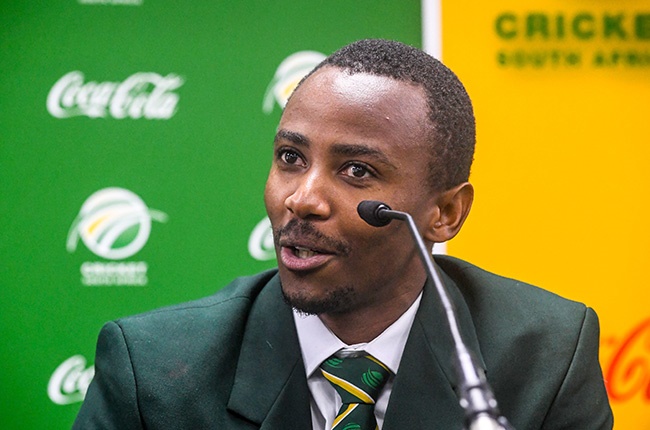


Wandile Gwavu (Photo by Sydney Seshibedi/Gallo Images)
- Mandla Mashimbyi (Titans), Wandile Gwavu (Lions), Ashwell Prince (Cobras), Imraan Khan (Dolphins) and Robin Peterson (Warriors) make up five of the six domestic franchise coaches.
- South Africa had a player, who played for the Proteas and coached them at a World Cup, before they had a black African franchise coach.
- It’s unclear whether cricket’s pathway will lead to any of the black domestic coaches one day taking over the top Proteas job.
On the face of it, the domestic cricket scene has taken on a transformed complexion, but the deeper question is whether there’s a clear path for black coaches to become the Proteas head coach.
The honour of becoming the first black Proteas head coach fell to West Indian Ottis Gibson, which was great for the African diaspora but robbed a local candidate of the opportunity. Soon after Gibson’s reign ended last year, Enoch Nkwe, the current assistant coach, was handed the role on an interim basis. It was a victory, albeit short-lived.
Both appointments left a big question mark lingering over the sport regarding whether a black South African head coach would see a day when they take charge of the national team and do so without their hand held by a white counterpart.
Post unity, Gary Kirsten played for South Africa at a World Cup, and coached them at a World Cup, before a black African South African coached the team.
And by the time Kirsten first took over the Proteas role in 2011, it took another year for the first black African coach to take charge of a franchise: Geoffrey Toyana at the Lions in 2012.
But the domestic scene looks a lot different. Five of the six franchise coaches are people of colour – Mandla Mashimbyi (Titans), Wandile Gwavu (Lions), Ashwell Prince (Cobras), Imraan Khan (Dolphins) and Robin Peterson (Warriors) – and two of them are black Africans. Allan Donald, the Knights head coach, completes the six.
Don’t let Pat Symcox and Boeta Dippenaar’s belittling of Lungi Ngidi’s stand on the #BlackLivesMatter influence you otherwise, the look of the domestic coaching scene matters and, as it stands, is something to be lauded.
It builds public trust within the game’s followers, sponsors and stakeholders (which includes the government, like it or not) that the sport is moving forward from a time where the top roles were the preserve of white people, both before and after unity.
Mashimbyi took over when Mark Boucher was promoted to the national team job and, although the Titans struggled to reach their usually lofty heights so far, he was backed to continue in the job when Boucher’s stay became long-term.
The appointment said a lot about the growth of a franchise that, not long ago, trusted a conditioning coach to lead the team (Rob Walter) ahead of a black African head coach candidate (Malibongwe Maketa) from within their ranks.
Gwavu, who won the Cricket South Africa (CSA) coach of the season award recently, was the beneficiary of the Central Gauteng Lions’ aggressive transformation policies.
The Lions have been unapologetic in trying to put representation at the top of their mandate, even if it’s sometimes caused internal conflict and distrust among its club constituencies.
They bravely gave Toyana his big break and were rewarded handsomely: Four major honours in four years.
Success followed when Enoch Nkwe succeeded Toyana, winning three of the four trophies Nkwe’s teams competed in, including the inaugural Mzansi Super League with the Jozi Stars.
Gwavu is the latest beneficiary of an aggressive transformation policy.
But it’s not the policy that won him favour; his ability to lead the franchise into the next era spoke for him.
Gwavu told Sport24 that when Nkwe was about to be appointed Lions head coach, they met and discussed the possibility of him becoming Nkwe’s assistant. So impressed by him was Nkwe that he recommended the 33-year-old assistant succeed him at the Wanderers when he rose to the national team last year.
Peterson and Prince, who both come with Proteas playing pedigree, will no doubt also make a case for themselves to be in the running at international level. And so, too, will Khan, whose Dolphins were crowned One Day Cup champions this year.
The question is whether Boucher’s successor, whenever that may be, will be someone representative of some of the other, equally qualified, candidates of different races, primarily black African.
History tells us that this clarion call needs to be sounded early and consistently, otherwise change will always come in increments and seldom at the biggest and most important stage.

